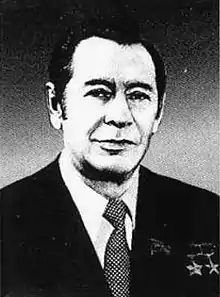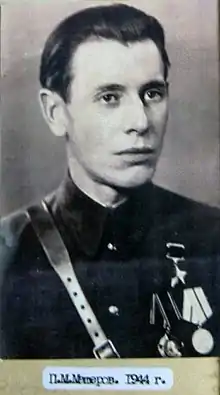Pyotr Masherov
Pyotr Mironovich Masherov (Belarusian: Пётр Міронавіч Машэраў; Russian: Пётр Миронович Машеров; 26 February [O.S. 13 February] 1918 – 4 October 1980) was the first secretary of Belorussian branch of the Communist Party of Soviet Union and thereby the de facto leader of Soviet Belorussia. Under nickname "Dubnyak" he organized and headed cellar Komsomol organization.
Pyotr Masherov Пётр Машеров | |
|---|---|
 | |
| First Secretary of the Communist Party of Byelorussia | |
| In office 30 March 1965 – 4 October 1980 | |
| Preceded by | Kirill Mazurov |
| Succeeded by | Tikhon Kiselyov |
| Candidate member of the 23rd, 24th, 25th, 26th Politburo | |
| In office 8 April 1966 – 4 October 1980 | |
| Personal details | |
| Born | 26 February 1918 Gomel Region, Russian Empire |
| Died | 4 October 1980 (aged 62) Minsk, Byelorussian SSR, Soviet Union |
| Nationality | Soviet |
| Political party | Communist Party of the Soviet Union (1943–1980) |
| Other political affiliations | Communist Party of Byelorussia |
| Spouse(s) | Polina Andreevna |
| Relations | 3 sisters 1 brother |
| Children | Natalia and Elena |
| Profession | Civil servant |
| Awards | |
Overview

Masherov was born in peasant's family. Masherov was born as Petr Mashero in a village in Vitsebsk region of Belorussia and before the outbreak of the Great Patriotic War in 1941 worked as a high school physics and math teacher. Between 1942 and 1944, Masherov led an underground group of Soviet partisans in Belarus and was awarded title Hero of the Soviet Union in August 1944.
In 1965, after holding some key positions in Belarusian regions and in Minsk, Masherov became the first secretary of the Communist party in Belarus: "if a party leader was honest and incorruptible - and there were category such as Masherov, party boss in White Russia, he acquired the reputation of a saint".[1]
In 1978, Masherov was awarded Hero of Socialist Labor title for his contributions to the development of Belorussian republic.[2]
On the delay in repayment of agriculture and industrial credits by state financial authorities gave a "highly critical speech" at the July (1978) Plenum of the Belorussian Central Committee.[3]
Death
He died in an automobile accident when his car, escorted by police, collided with a produce truck (potatoes) that had unexpectedly entered the freeway.[4] He was honored with a state funeral in Minsk, which was attended by the First Secretary of the Communist Party of Lithuania Petras Griškevičius. Later that year, Masherov Avenue (Now Victors Avenue) was named in his honor.[5] After his death, conspiracy theorists believed it to be an assassination conducted by the Soviet national security agency the KGB.
Honours and awards
- Hero of the Soviet Union
- Hero of Socialist Labour
- Seven Orders of Lenin
- Jubilee Medal "In Commemoration of the 100th Anniversary since the Birth of Vladimir Il'ich Lenin"
- Medal "Partisan of the Patriotic War" 1st class
- Medal "For the Victory over Germany in the Great Patriotic War 1941–1945"
- Jubilee Medal "Twenty Years of Victory in the Great Patriotic War 1941-1945"
- Jubilee Medal "Thirty Years of Victory in the Great Patriotic War 1941-1945"
- Medal "For the Development of Virgin Lands"
- Jubilee Medal "50 Years of the Armed Forces of the USSR"
- Jubilee Medal "60 Years of the Armed Forces of the USSR"
- Jubilee Medal "50 Years of the Soviet Militia"
- Order of Georgi Dimitrov (Bulgaria)
References
- Walter Laqueur, Gorbachev and Epimetheus: The Origins of the Russian Crisis, Journal of Contemporary History, Vol. 28, No. 3 (Jul., 1993), p. 418.
- Chen, C. Peter. "Pyotr Masherov". WW2DB. Retrieved 2017-11-10.
- Robert F. Miller, The Politics of Policy Implementation in the USSR: Soviet Policies on Agricultural Integration under Brezhnev, Soviet Studies, Vol. 32, No. 2 (Apr., 1980), p. 194.
- "Pyotr Masherov, 62, Leader Of Byelorussian Communists". The Washington Post. 6 October 1980. ISSN 0190-8286. Retrieved 11 January 2017.
- https://charter97.org/en/news/2018/9/13/305165/
See also
| Wikimedia Commons has media related to Piotr Mašeraŭ. |